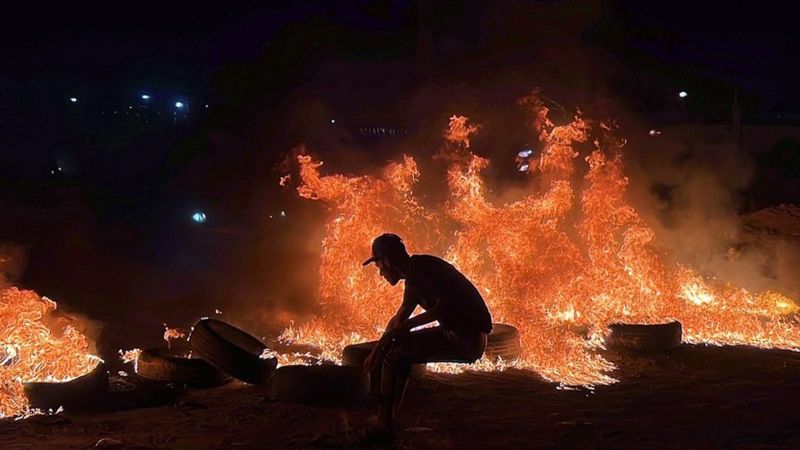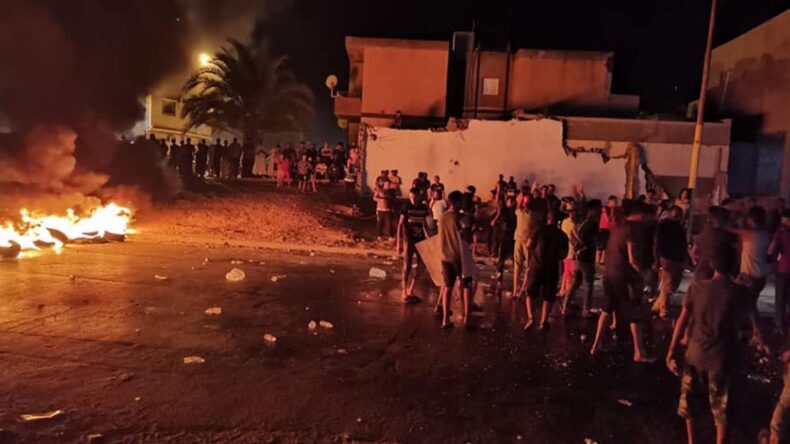The Libyan Internal Security Service disputed claims that it had authorised or assisted the departure of Foreign Minister Najla al-Mangoush and declared that her name had been added to the list of those prohibited from flying.
Following a nocturnal protest by hundreds of people in the capital and other regions of Libya, rumours that the minister had left the nation started to spread.
Eli Cohen, the foreign minister of Israel, said that he had met with al-Mangoush last week in Rome, which infuriated the Libyans.
Al-Mangoush’s “temporary suspension” was announced by Prime Minister Abdulhamid Dbeibeh, and she was succeeded as interim foreign minister by Fathallah al-Zani, the current youth minister. Al-Mangoush would be the focus of a “administrative investigation,” he added.
Israel angered over the announcement
The political spat started on Sunday after Israel’s foreign ministry claimed that the foreign ministers of the two nations had met the week prior at a gathering held by Antonio Tajani, the foreign minister of Italy.
In a statement from Israel’s foreign office, Israeli Foreign Minister Eli Cohen said, “I spoke with the foreign minister about the great potential for the two countries from their relations. It is the first such diplomatic initiative between the two countries.”
Israel did not handle the news well either; critics there noted that Cohen’s actions went against proper diplomatic protocol.
Cohen’s announcement, according to Channel 12 in Israel, has significantly harmed Israel’s credibility.
Al-Mangoush “refused to meet with any party” representing Israel, according to the Libyan foreign ministry.
“What happened in Rome was a chance and unofficial encounter, during a meeting with his Italian counterpart, which did not involve any discussion, agreement, or consultation,” the ministry cliamed.
Additionally, it charged that Israel had attempted to “present this incident” as a “meeting or talks”.
The ministry emphasised that it “completely and unequivocally rejects normalisation with the Zionist formation” and reaffirmed “in a clear and unambiguous manner Libya’s position regarding the Palestinian cause”.
The North African nation has no diplomatic ties to Tel Aviv and does not recognise Israel. Dealing with Israel is illegal by a 1957 statute in Libya, which carries a maximum nine-year prison sentence.

Is normalization a possibility?
In a meeting with Dbeibah and CIA Director William Burns, who visited the Libyan capital in January, the normalisation of relations between Libya and Israel was first broached, an anonymous Libyan government official told The Associated Press.
The official claims that Burns suggested that Libya’s internationally recognised and supported government of Dbeibah join the quartet of four Arab nations that normalised relations with Israel via the US-mediated Abraham Accords in 2020.
The person claimed that although the Libyan premier initially agreed, he was wary of public backlash in a nation recognised for its advocacy of the Palestinian cause.
Al-Mangoush and Cohen’s encounter, which lasted more than an hour, was pre-arranged “at the highest levels” in Libya, an Israeli official told the Reuters news agency on Monday.
Yair Lapid, Israel’s former prime minister and foreign minister, slammed Cohen for disclosing the private meeting.
As a result of US-backed agreements known as the Abraham Accords, Israel has recently normalised relations with various Arab nations.
However, due to the escalating violence in the occupied West Bank and for supporting the growth of Jewish settlements there, Arab states have harshly criticised Prime Minister Benjamin Netanyahu’s conservative government.
Overnight protests
Social media videos captured protests against al-Mangoush’s removal on Sunday night in front of the Tripoli foreign ministry headquarters. In addition to demanding Dbeibah’s resignation, several demonstrators set fire to his Tripoli home.
Malik Traina of Al Jazeera said the following in a report from Tripoli: “People were blocking roads and burning tyres in Tajoura and Soug al-Jumaa, and protesters in al-Zawiya were demanding the downfall of the entire administration due to this meeting. Other protests were visible in Misrata.
Both legislative organizations, the House of Representatives (HoR) in Tobruk and the High Council of State in Tripoli, according to Traina, have denounced the meeting and demanded an urgent meeting to examine it. The HoR has referred to the gathering as a “crime committed against the Libyan people.”
According to Libya Al Ahrar TV, which cited spokeswoman Najwa Wheba, the Libyan Presidential Council requested “clarifications” from the administration earlier on Sunday evening.
Three members from the three regions of Libya make up the Presidential Council, which was born out of the political process sponsored by the UN and has some executive powers.
According to their request, the meeting “does not reflect the foreign policy of the Libyan state, does not represent the Libyan national constants, and is considered to be a violation of Libyan laws which criminalize normalization with the Zionist entity.”













